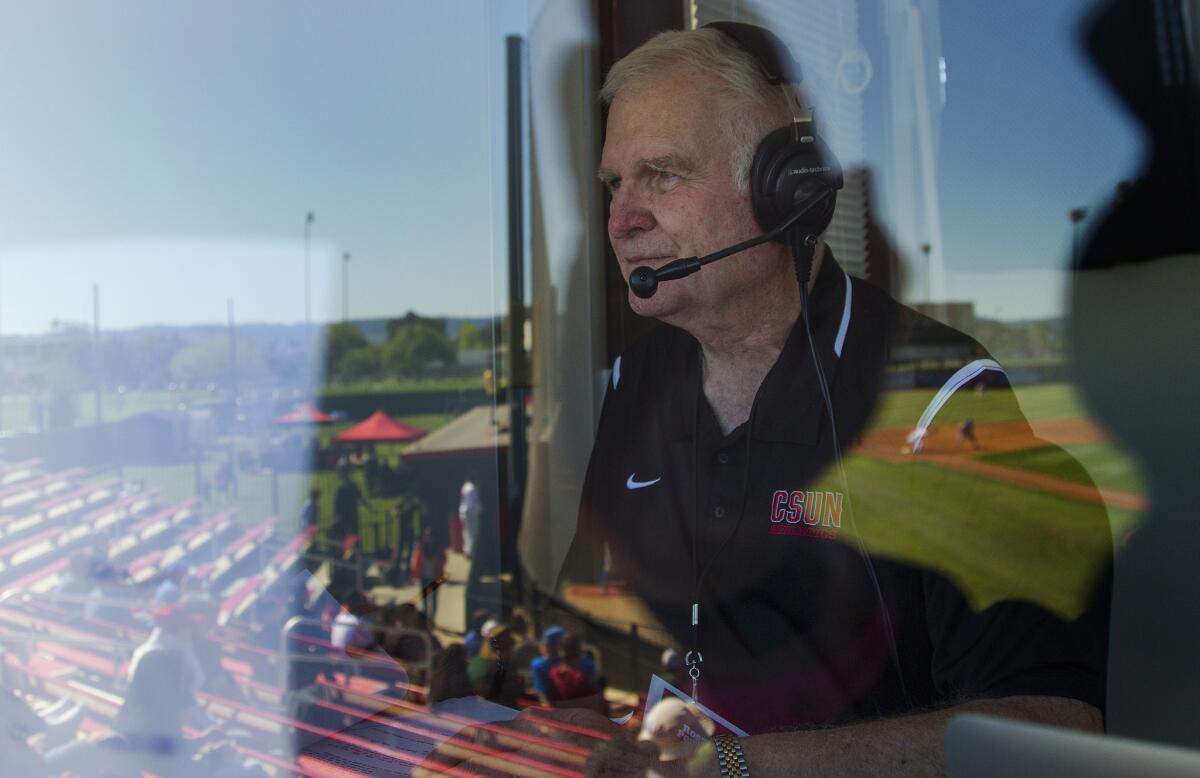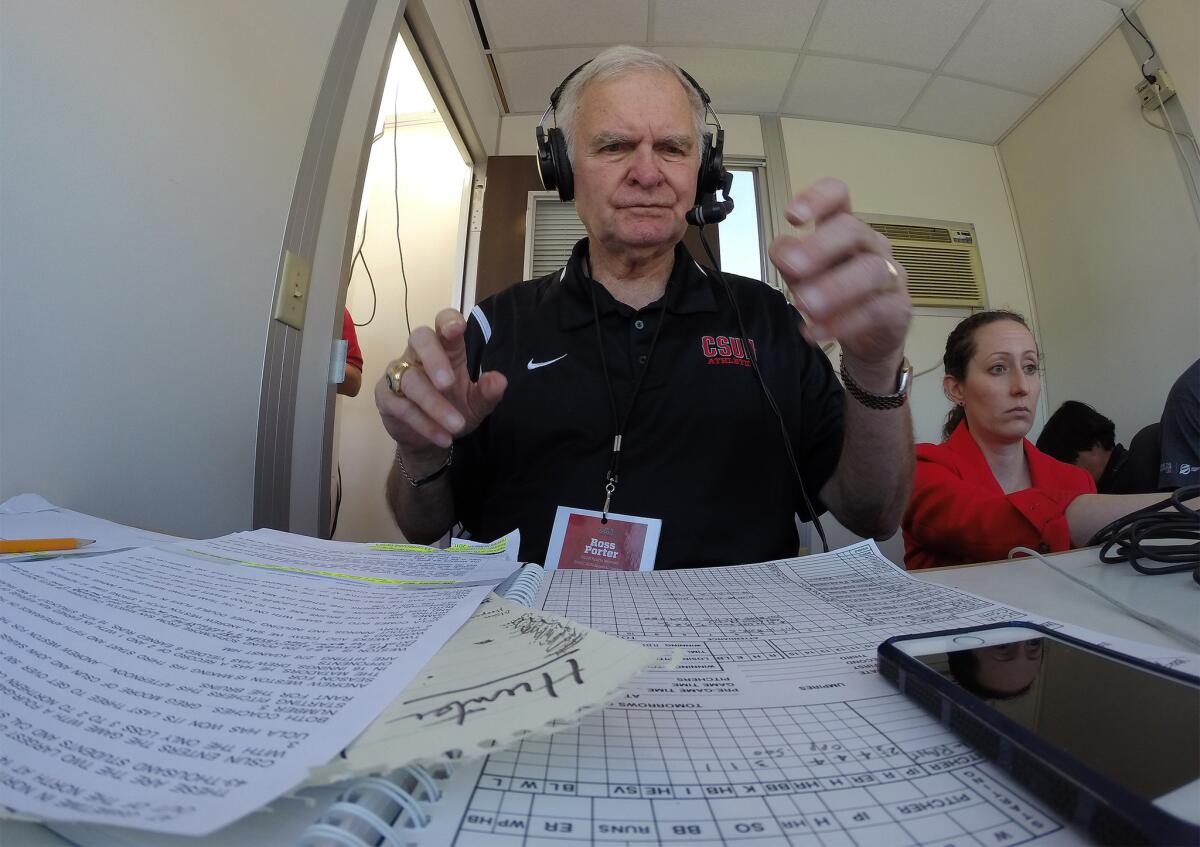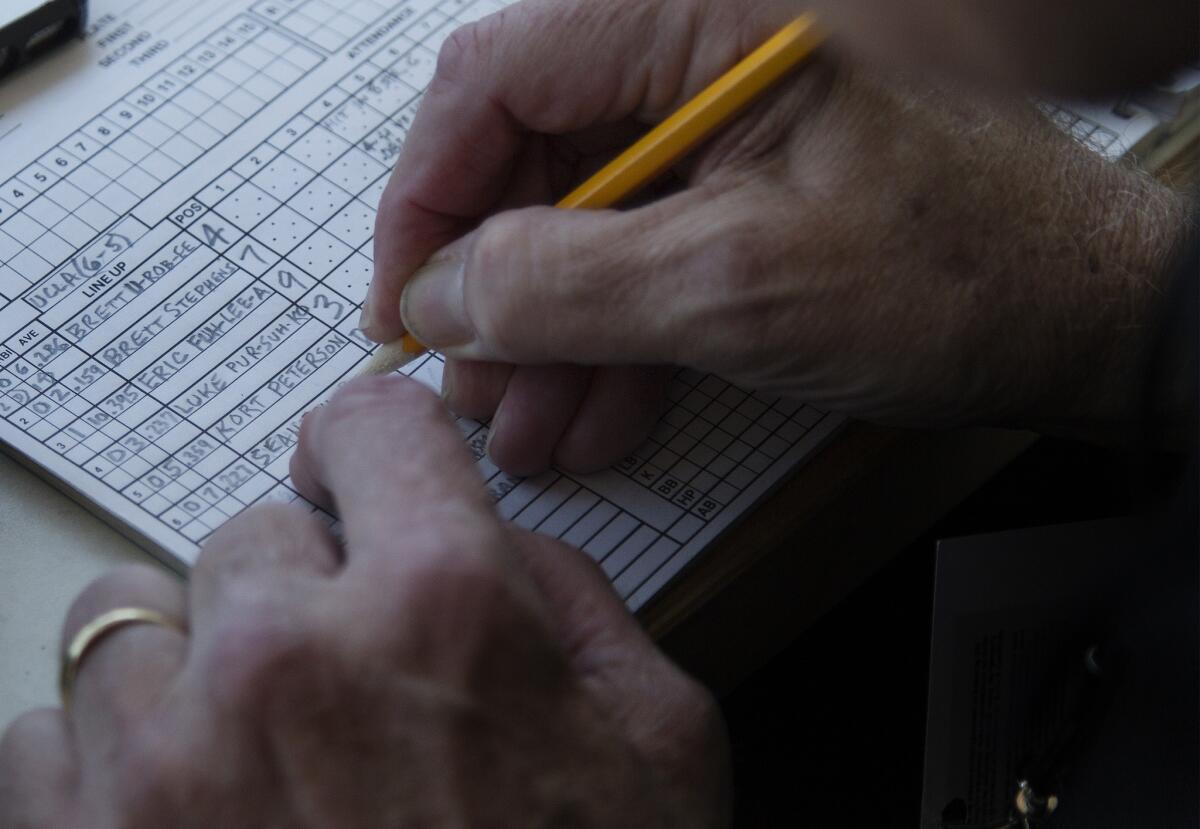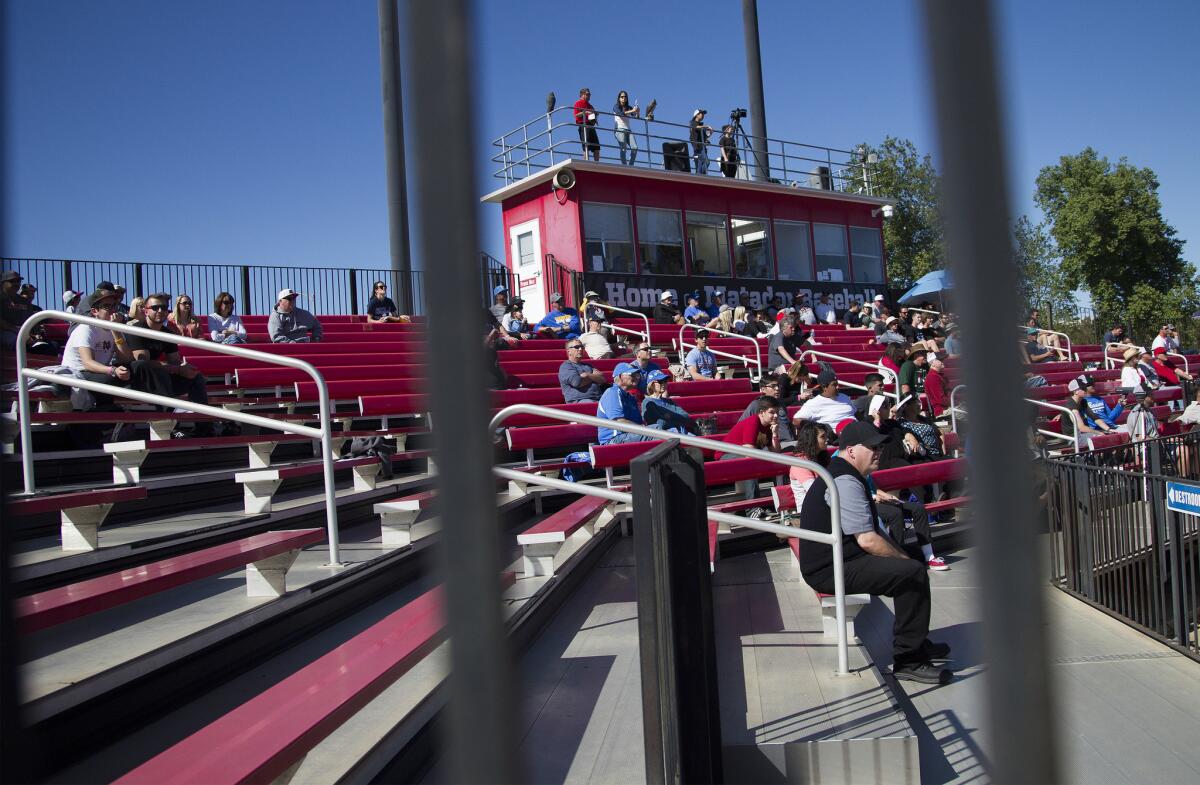At Cal State Northridge, Ross Porter is a voice from the past

Former Dodgers broadcaster Ross Porter does the play-by-play call for a web-only broadcast of a college baseball game between Cal State Northridge and UCLA on March 8.
- Share via
It is 40 minutes to game time, and the broadcaster excuses himself from the press box. He has been at the ballpark for close to two hours already, setting up his laptop, checking in with the coaches, taping statistics and rosters to the window in front of him.
He is 78. He shuffles down the steps of the metal bleachers, wearing a black Cal State Northridge polo shirt beneath a head full of silver hair and a ready smile. No one stops him on the way down. One person stops him on the way back.
He used to be one of the voices of summer in Los Angeles, but the Northridge students are too young to know. They would have to look closely at his right hand to see the ring, the one with the blue stone, the one he earned by calling the games of the Dodgers’ last World Series championship team, in 1988.
Where have you gone, Ross Porter?
I’ve always been a late-night person. I’ve got to do it. I don’t know the kids.
— Ross Porter, on staying up until 3 a.m. to prepare for a game

Ross Porter prepares his lineups and reference material before an Internet broadcast of a college baseball game between Cal State Northridge and UCLA.
He has gone to Matador Field, calling games at a school where the campus radio station does not put baseball on the air, where the attendance for this day’s big game against UCLA is announced as 503.
For 28 years, Porter and Vin Scully were partners in the Dodgers’ broadcast booth. The Dodgers let Porter go in 2004, and he has not been the voice of any team since then. He could while away his days happily, with his wife of 54 years, Lin, with his church and community work, with his golden retriever.
“But he loves announcing,” Lin says. “This is just such a fun thing.”
When Cal State Northridge called, Porter agreed to call 18 home games this year, all on the Internet. More than a decade after the Southern California Sports Broadcasters inducted him into their Hall of Fame, Porter turns on his microphone and says, “Thanks for joining me on GoMatadors.com.”
The audience count for this day’s webcast turns out to be 990 — “phenomenal” by CSUN standards, according to associate athletic director Amy Millstone. Porter is happy to embrace technology.
“Why don’t you send me a Twitter this afternoon?” he asks his listeners.
As longtime Dodgers fans would expect, Porter throws out a few numbers at the top of the broadcast.
The temperature is 69 degrees. The wind speed is 14 mph. The student body numbers 43,000 at UCLA and 42,000 at CSUN.
“These are the largest universities in California, in terms of enrollment,” Porter says.
The second Matadors batter is hit by a pitch. That reminds Porter that senior Branden Berry has been hit by a pitch 38 times.
“What would it feel like to be hit 38 times in your college career?” Porter asks.
Porter was noted, and at times mocked, for the emphasis he put on statistics as a Dodgers broadcaster. In retrospect, he was ahead of his time. Today, he insists he was not trying to establish himself as a numbers whiz as much as he was trying to distinguish himself from Scully.
“Vin is the greatest baseball storyteller of all time,” Porter says before the game. “I didn’t have a background of anecdotes. I said to myself, what can I do that’s a little different?
“I got a blue book. I’d put Don Sutton on top, and I’d have a page for him against the Reds. That’s how I could say Pete Rose was two for four against Sutton, with a double. I leaned on that quite a bit.”
That was 1977, long before that information was just a click away. The drive that compelled Porter to spend hours with a blue book, a pencil and a box score has not waned.

Ross Porter enters the lineups into his scorebook for a game between Cal State Northridge and UCLA.
The work Porter puts into this webcast would put more than a few major league broadcasters to shame. In the days preceding this game, he attended a UCLA game, followed CSUN on its East Coast trip via the Internet, spoke several times with each coach, and stayed up until 3 a.m. to complete his preparation.
“I’ve always been a late-night person,” he said. “I’ve got to do it. I don’t know the kids.”
He uses the same scorebook he did with the Dodgers — the 1999 Dodgers. He arrives with a stack of notes, many of them handwritten, then discards them as he uses each bit of information.
The flat-seam ball used in the NCAA travels 25% farther than the old ball with raised seams. CSUN infielder Nolan Bumstead told the school newspaper that the academics in his Canadian high school “are considerably harder than the college courses in the U.S.” The Bruins are having trouble throwing out runners, largely because of an injury to their starting catcher, who is the son of former Angels catcher Darrell Miller and the nephew of NBA great Reggie Miller and legendary basketball player Cheryl Miller.
Up comes UCLA outfielder Christoph Bono.
“Bono,” Porter says to his audience. “Does that ring a bell? No, it’s not Sonny’s kid.”
That’s a dated reference; the former musician and congressman died 18 years ago. As Porter explains, Bono actually is the son of former UCLA quarterback — and catcher — Steve Bono. But what other college announcer can share stories of his conversations with Scully, and with the late USC coach Rod Dedeaux, who won a record 11 NCAA championships?

The view from the seats to the press box is quite different at Cal State Northridge than Dodger Stadium.
The game enters its fourth hour. Between innings, the Matadors summon their sixth pitcher, freshman Matt Campbell. Porter raps urgently on the window, attracting the attention of the man seated below the press box. The man stands up and turns around; Porter gives him a thumbs-up.
“That’s his dad,” Porter explains before resuming the webcast.
Of the first 46 CSUN batters, the Bruins hit eight — none of them Berry, the guy Porter pointed out as most likely to be hit by a pitch. Up comes Berry, the 47th batter.
“And Berry gets hit on the elbow,” Porter says to his audience, a sigh in his voice. “They finally got him. It was just a matter of time.”
The game ends. Northridge wins, 20-12. Porter and his wife live in Woodland Hills, so they’ll be home in a few minutes. For this day, the man with the still-booming voice has just a few words left to say.
“This is Ross Porter wishing you a very good evening,” he says, “from Matador Field in Northridge, California.”
Follow Bill Shaikin on Twitter: @BillShaikin
More to Read
Go beyond the scoreboard
Get the latest on L.A.'s teams in the daily Sports Report newsletter.
You may occasionally receive promotional content from the Los Angeles Times.











